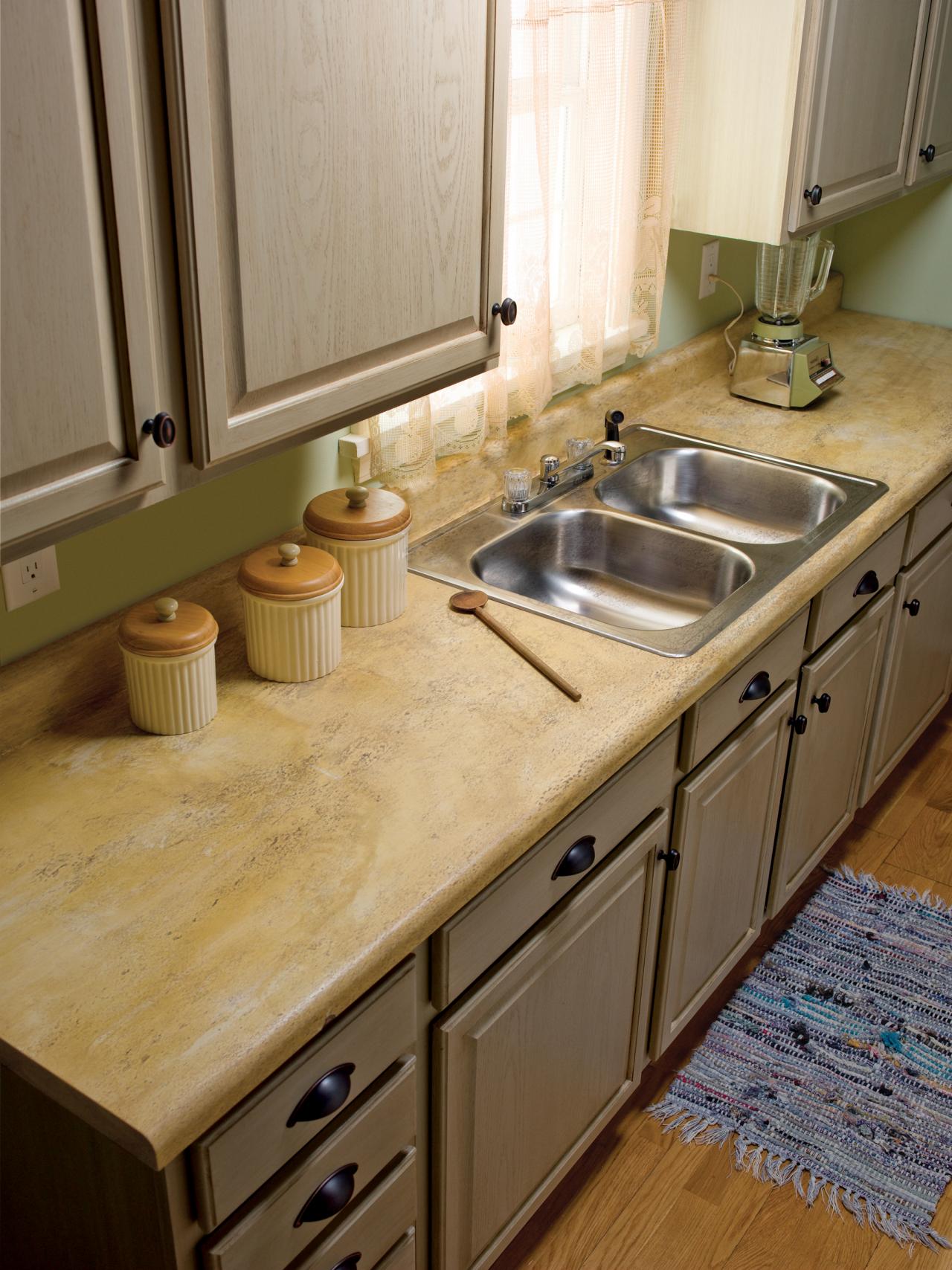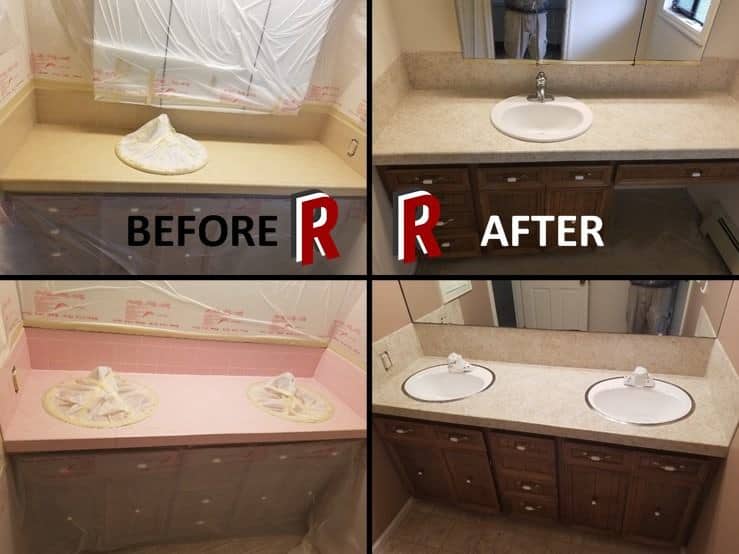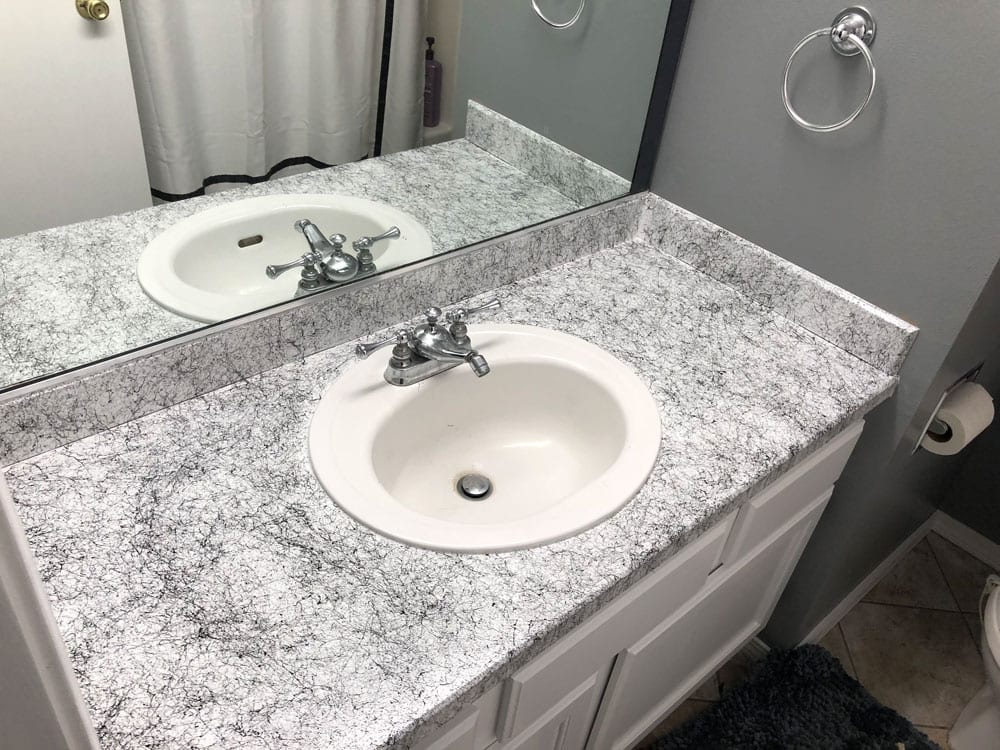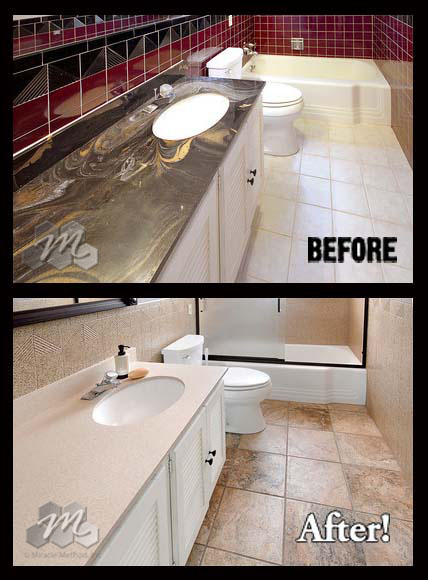Bathroom countertop resurfacing is a cost-effective and efficient way to update the look of your bathroom without the expense and inconvenience of a full countertop replacement. Over time, bathroom countertops can become worn, scratched, or stained, detracting from the overall appearance of the space. Resurfacing allows you to repair and refinish the existing countertop surface, giving it a fresh new look while extending its lifespan. Here’s a comprehensive overview of bathroom countertop resurfacing:
Assessment: Before beginning the resurfacing process, assess the condition of your bathroom countertop to determine if resurfacing is the right option. Minor surface imperfections such as scratches, stains, or dullness can often be addressed with resurfacing, but deeper damage or structural issues may require replacement.
Cleaning: Start by thoroughly cleaning the countertop surface to remove any dirt, grime, or residues that may interfere with the resurfacing process. Use a mild detergent or cleaning solution and a soft cloth or sponge to clean the surface. Rinse with water and allow the countertop to dry completely before proceeding.
Repair: If the countertop has any chips, cracks, or other damage, repair them before resurfacing. Use a suitable filler or epoxy to fill in any imperfections, following the manufacturer’s instructions carefully. Allow the repairs to dry and cure completely before continuing with the resurfacing process.
Surface Preparation: Proper surface preparation is crucial for achieving a smooth and durable finish with countertop resurfacing. Sand the entire surface of the countertop to create a rough texture that will help the new finish adhere properly. Use fine-grit sandpaper (around 120 to 220 grit) and sand in a circular motion to avoid creating visible scratches or gouges. Wipe away any dust with a damp cloth or tack cloth.

Choose a Resurfacing Method: There are several methods for resurfacing bathroom countertops, including painting, refinishing, or applying a new overlay. Choose the method that best suits your budget, skills, and desired outcome. Each method has its pros and cons, so research carefully before making a decision.
Painting: Painting is a popular option for resurfacing bathroom countertops, as it allows for endless color and design possibilities. Use a high-quality, oil-based primer designed for countertops, followed by acrylic latex paint in your chosen color. Apply multiple thin coats for a smooth, durable finish, and allow each coat to dry completely before applying the next.
Refinishing: Refinishing involves applying a new layer of material, such as epoxy or polyurethane, over the existing countertop surface. This method can create a durable, waterproof finish with a glossy or matte appearance. Follow the manufacturer’s instructions carefully for preparing and applying the refinishing material, and allow it to cure fully before using the countertop.

Overlay: Applying a new overlay is another option for resurfacing bathroom countertops. This involves adhering thin sheets of material, such as laminate or quartz, over the existing countertop surface using adhesive. Choose a material and design that complements your bathroom decor, and carefully follow the manufacturer’s instructions for installation.
Apply a Protective Finish: Once the resurfacing process is complete, apply a protective finish to seal and protect the new surface. Choose a clear, waterproof sealant designed for use on bathroom countertops, such as polyurethane or epoxy. Apply multiple thin coats, allowing each coat to dry completely before applying the next.
Allow Sufficient Drying Time: Proper drying time is essential to ensure that the resurfacing materials cure fully and adhere properly to the countertop surface. Follow the manufacturer’s recommendations for drying and curing times for each product used in the resurfacing process. Avoid using the countertop until it has fully cured to prevent damage to the finish.
Clean and Maintain Regularly: Once the resurfacing process is complete, clean and maintain the bathroom countertop regularly to preserve its appearance and longevity. Use mild soap and water or a non-abrasive cleaner to clean the surface, and avoid using harsh chemicals or abrasive scrubbers that can damage the finish.
Avoid Excessive Heat and Moisture: While resurfaced bathroom countertops are relatively durable, they can be damaged by excessive heat or moisture. Use trivets or hot pads to protect the surface from hot hair styling tools or other hot items, and wipe up spills promptly to prevent water damage.

Be Gentle with the Surface: Even though resurfaced bathroom countertops are durable, they can still be scratched or damaged by sharp objects or heavy impacts. Use cutting boards and chopping blocks to protect the surface when cutting or chopping food, and avoid dropping heavy objects onto the countertop.
Consider Professional Resurfacing: If you’re not confident in your DIY skills or if the countertop has significant damage, consider hiring a professional to resurface it for you. A professional resurfacer will have the expertise and equipment needed to achieve professional-quality results.
Budget for Maintenance and Replacement: While resurfacing can extend the lifespan of your bathroom countertop, it’s important to budget for regular maintenance and eventual replacement as needed. Proper care and maintenance can help prolong the life of the countertop, but eventually, it may need to be replaced due to wear and tear or changes in decor.

Can I resurface my bathroom countertop myself?
Yes, resurfacing a bathroom countertop is a DIY-friendly project that can be done with basic tools and materials. However, if you’re not confident in your skills or if the countertop has significant damage, consider hiring a professional resurfacing.
How long does it take to resurface a bathroom countertop?
The time required to resurface a bathroom countertop depends on the method used and the condition of the countertop. Painting or refinishing can typically be completed in a weekend, while applying a new overlay may take longer.
How durable is a resurfaced bathroom countertop?
The durability of a resurfaced bathroom countertop depends on factors such as the quality of materials used, the application technique, and the level of care and maintenance. With proper care, a resurfaced bathroom countertop can last for many years.
Can I use my countertop immediately after resurfacing?
It’s important to allow sufficient drying and curing time after resurfacing a bathroom countertop before using it. Follow the manufacturer’s recommendations for drying and curing times, and avoid using the countertop until it has fully cured to prevent damage to the finish.
What is the best way to clean and maintain a resurfaced bathroom countertop?
To clean and maintain a resurfaced bathroom countertop, use mild soap and water or a non-abrasive cleaner to clean the surface regularly. Avoid using harsh chemicals or abrasive scrubbers that can damage the finish, and be gentle with the surface to prevent scratches or damage.

Counter Top Resurfacing, Kitchen & Bathroom Countertops

Bathroom Countertop Refinishing – A budget-friendly bathroom update

Bathroom Countertops Refinishing

Countertop Refinishing – Refinish your Counter Tops – Miracle Method

Remodelaholic Painted Bathroom Sink and Countertop Makeover

Related articles:
- Bathroom Countertop Refinishing Ideas
- White Quartz Bathroom Countertops
- Small Bathroom Countertop Cabinet
- Grey Bathroom Countertops
- Bathroom Countertop Organization Ideas
- Bathroom Countertops Types
- Rustic Bathroom Countertops
- Bathroom Countertop Redo
- Bathroom Countertop Decor Ideas
- DIY Bathroom Countertop Refinishing